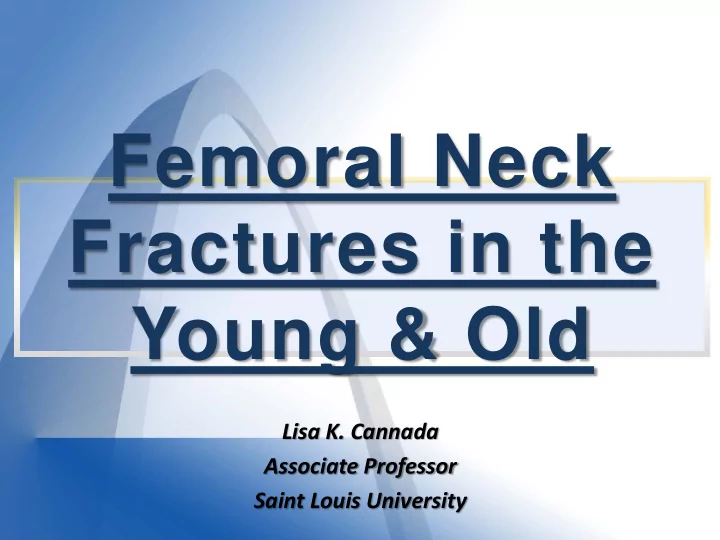

Femoral Neck Fractures in the Young & Old Lisa K. Cannada Associate Professor Saint Louis University
Disclosures • No pertinent disclosures • Member: – AAOS Board of Directors – MAOA Board of Directors – OTA Committee Member
First….Define Young
On Call
Define Young
Reality: How to Keep Your 35 yo patient from getting a THA…which is the answer for the old
Tip #1: Pre op Planning
Decision Making Variables: Patient Factors • Young – High energy injuries • Often High Pauwels Angle (shear) • Comminution
Pauwels Classification stable Less stable unstable Images from: Court-Brown, C. et al. Rockwood & Greens Fractures in Adults. Philadelphia: Lippincott Williams & Wilkins, 2014
Tip #2: Limit AVN
Pre-operative Considerations: Timing of ORIF in Young • Surgical Urgency?
Capsulotomy? • During open reduction or percutaneously – Reduces intracapsular pressure from fracture hematoma? • Increased capsular pressure not clinically associated with AVN – Maruenda et al, CORR 1997
Tip #3: Reduction Matters (most)
Closed versus Open Reduction • Closed versus open reduction does not seem to affect nonunion or AVN rates but data is very limited • MAIN GOAL: GOOD REDUCTION 14
Closed Reduction • Flexion, slight adduction, slight traction • Apply traction, internally rotate to 45 degrees, followed by full extension, slight abduction
Open approach • Smith-Peterson – Direct access to fracture – Between TFL and sartorius – Second approach needed for fixation
Open approach • Watson-Jones – anterolateral – Between TFL and gluteus medius – Same approach for fixation – Best for basicervical
Open Reduction Technique • Fracture table or flat jackson • Use schanz pins, weber clamps, or jungbluth clamp for reduction
Tip #4 Stable Fixation
Fixation Constructs • 3 Screws • 4 Screws • Dynamic hip screw • Blade plate
Fixation Concepts • Reduction makes it stable – Avoid ANY varus – Avoid inferior offset • Malreduction likely to fail
Fixation Concepts: What Matters?
Fixation Concepts: Screw Fixation Lateral Epiphyseal Good Bad Artery Anterior Posterior - Good spread - Clustered together - Hugging Calcar and - Nothing on calcar posterior cortex - Posterior and inferior screws are most important
This Matters
Fixation Concepts • Sliding hip screw – May help with comminution – Basicervical – Accessory screw for rotation • Can use small frag plate for reduction as well
TAD Matters!
YOUNG FNF Summary • Femoral neck fractures in < 60 – take physiology and activity into account • Ideally, fix within 24 hours • Reduction is likely more important than: – Capsulotomy – Type of approach – Method of fixation • Follow closely for shortening, AVN and nonunion 27
Thank You! Lcannada@slu.edu
Recommend
More recommend